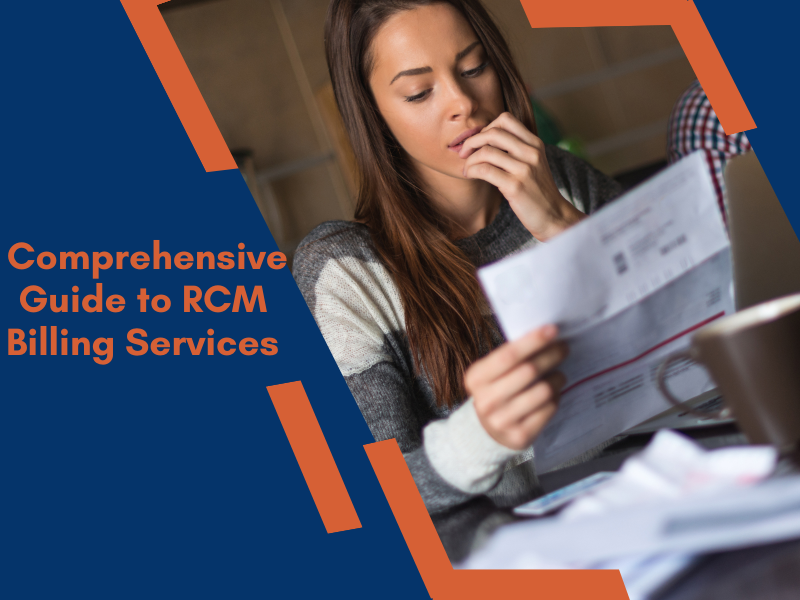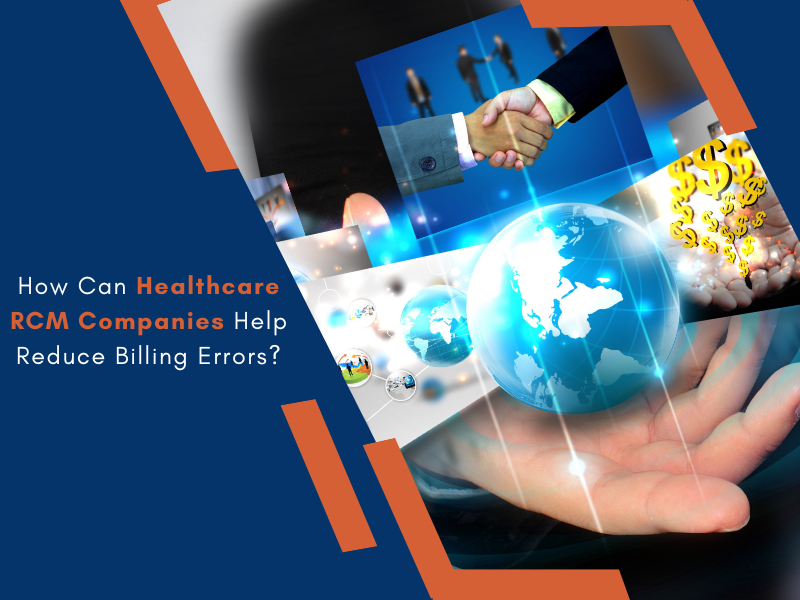The funding aspects of a contemporary healthcare centre can be the factor that is rather difficult to manage in the times when the progress is constantly accelerating. RCM billing services are very important in making sure that healthcare providers are continuously generating their revenues. The RCM healthcare services in the USA have culminated into easing the billing and claims to ensure that the providers spend a minimal time and energy on handling such accounts rather than being devoted to the patients.
This guide will also discuss the need for and operations of RCM billing services with respect to the cash and financial cycle of healthcare providers.
What Is Revenue Cycle Management (RCM)?
RCM is the process through which the healthcare provider assigns individual patients and episodes of care to a unique identification number, from registration and appointment through to payment of a balance. RCM proposes that a healthcare organization should have got the capability to capture, manage and collect patient service revenues. This process involves multiple steps such as:
- Patient registration
- Insurance verification
- Medical coding and billing
- Claims submission
- Payment collection
- Denial management
With proper organization and utilization of the right resources, RCM healthcare services in the USA optimize such activities and bring about a positive change in the physicians’ cash flows and overall revenue for the medical organizations.
Key Components of RCM Billing Services
To fully grasp the importance of RCM billing services, it’s essential to understand the key components involved in the revenue cycle.
1. Patient Pre-Registration and Registration
The revenue cycle starts even before a patient sets foot in the doctor’s office. Pre-registration involves collecting insurance details and other personal information to streamline the billing process. This step helps ensure the patient’s eligibility for insurance coverage, reducing potential denials or delays in claims processing.
During actual registration, the patient’s details are entered into the system, providing the groundwork for accurate billing and coding. Proper registration is crucial for preventing errors that can lead to claim rejections.
2. Medical Coding
Medical coding is an essential component of RCM billing services. Once a patient receives treatment, healthcare providers assign codes that represent the diagnosis and procedures performed. These codes, based on the International Classification of Diseases (ICD) and Current Procedural Terminology (CPT), form the basis of claims submitted to insurance companies.
Accurate coding is crucial for receiving proper reimbursement. Errors in coding can lead to claim denials, underpayments, or even overpayments, which can cause compliance issues.
3. Claims Submission
After medical coding, the next step is submitting claims to insurance companies. Claims submission requires meticulous attention to detail to ensure accuracy in the patient’s details, coding, and insurance information.
Most healthcare providers use electronic claims submission to reduce paperwork and speed up the process. However, even in electronic submissions, errors can still occur. RCM healthcare services in the USA often rely on specialized software and expertise to ensure clean claims are submitted the first time, reducing the chances of denials or delays.
4. Payment Posting and Collection
Once claims are processed, payment from the insurance company is posted to the provider’s account. This stage involves reconciling payments with claims, identifying any discrepancies, and ensuring proper payment has been received. In cases where patients are responsible for a portion of the bill, payment collection from the patient begins.
RCM billing services ensure that healthcare providers follow up on unpaid balances and provide patients with clear communication on their payment obligations. Effective payment collection is key to maintaining a steady cash flow.
5. Denial Management and Resubmission
Not all claims are accepted the first time they are submitted. Denials can occur due to incorrect coding, missing information, or issues with patient eligibility. Managing these denials and appealing them is one of the more complex aspects of RCM.
An experienced RCM service provider helps to identify the reasons for denials, correct errors, and resubmit claims in a timely manner. Quick denial management prevents revenue losses and ensures that healthcare providers are reimbursed for their services.
6. Patient Billing and Follow-Up
In cases where insurance doesn’t cover the full cost of services, patients may need to cover part or all of the remaining balance. Patient billing should be handled in a clear, transparent manner to avoid confusion and frustration. RCM billing services provide timely patient statements and follow up on unpaid balances, ensuring that providers are paid for their services.
Benefits of RCM Healthcare Services in the USA
RCM healthcare services in the USA offer a range of benefits to healthcare providers of all sizes. From improving cash flow to reducing administrative burdens, these services help practices operate more efficiently and effectively. Here’s how:
1. Improved Financial Performance
By streamlining the entire revenue cycle, RCM services help improve the financial performance of healthcare organizations. This ensures quicker payments, fewer errors, and minimized claim denials, all of which contribute to better revenue collection.
2. Enhanced Efficiency
RCM services automate many of the time-consuming processes involved in billing and claims management, allowing healthcare providers to focus more on patient care. Tasks such as insurance verification, coding, and claims submission become more efficient, helping practices reduce overhead and administrative costs.
3. Reduced Errors
Manual billing and coding processes are prone to errors that can lead to claim denials or delays in payments. RCM billing services in the USA rely on specialized software and professional expertise to ensure that these errors are minimized, resulting in faster and more accurate payments.
4. Compliance and Regulatory Adherence
RCM services stay up to date with the latest healthcare regulations, helping providers remain compliant with government standards. This is particularly important in avoiding fines or penalties due to coding errors, fraud, or improper billing practices.
5. Better Patient Experience
When RCM services are handled efficiently, patients benefit from clear communication, timely billing, and easy-to-understand statements. This reduces confusion, enhances transparency, and improves the overall patient experience.
How to Choose the Right RCM Billing Service Provider
When selecting an RCM service provider, consider the following factors:
- Experience and Expertise: Choose a provider with a proven track record in the healthcare industry, particularly with your type of practice.
- Technology: Ensure the provider uses up-to-date software that integrates with your existing systems and complies with healthcare regulations.
- Transparency: Look for a provider that offers clear, transparent pricing and reporting so you can track your revenue cycle’s performance.
- Customer Support: Reliable customer support is crucial for addressing any issues that arise during the billing and claims process.
Conclusion
At Apaana Healthcare, we understand the challenges healthcare providers face when managing their revenue cycles. We offer comprehensive RCM healthcare services in the USA that help streamline your billing, coding, and claims processes, ensuring you get paid faster and with fewer errors.
Apaana Healthcare drives operational excellence with global healthcare management solutions. We specialize in outsourced services for health plans, covering member enrollment, claims administration, medical billing & coding, and provider engagement. Our focus on cost-effective solutions means you can rely on us to manage your RCM efficiently, leaving you free to focus on what matters most—providing excellent patient care.
Choose Apaana Healthcare for your RCM needs and experience the difference our expertise can make for your practice.
FAQs
What is RCM billing?
RCM (Revenue Cycle Management) billing is the process of managing a healthcare provider’s financial cycle, from patient registration to final payment, ensuring timely and accurate revenue collection.
Why is RCM important for healthcare providers?
RCM optimizes cash flow, reduces claim denials, ensures compliance with regulations, and minimizes administrative burdens, allowing healthcare providers to focus more on patient care.
What services are included in RCM billing?
RCM billing typically includes patient registration, insurance verification, medical coding, claims submission, payment collection, denial management, and patient billing.
How do RCM services improve financial performance?
By streamlining processes and reducing errors, RCM services ensure quicker reimbursements, minimize denials, and enhance overall revenue collection for healthcare providers.
Why choose Apaana Healthcare for RCM services?
Apaana Healthcare offers cost-effective RCM solutions tailored to healthcare providers, leveraging advanced technology and expertise to optimize billing, coding, and claims processes for better financial outcomes.





